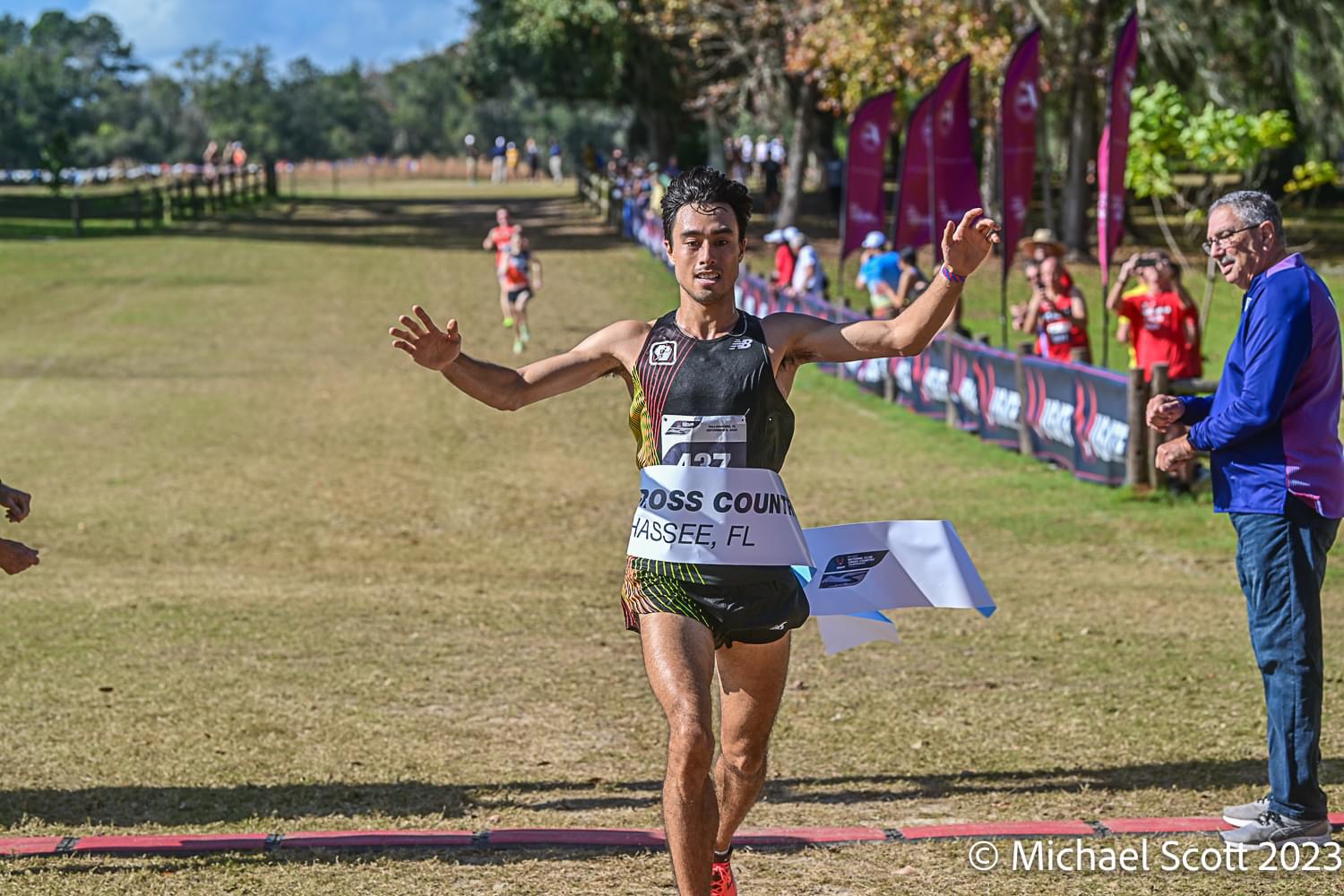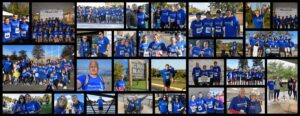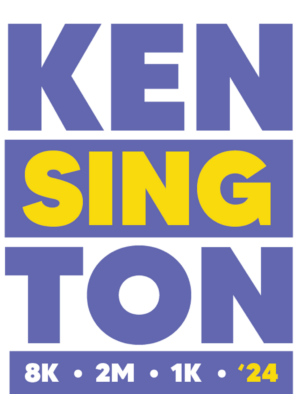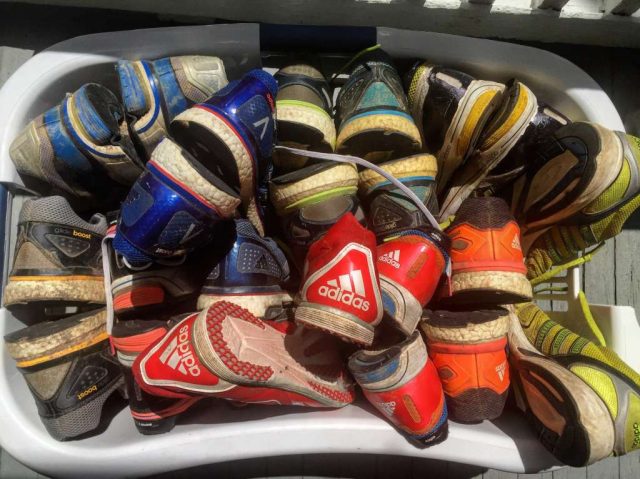
Spring is here along with signs of the season: blooming flowers, warmer temperatures and dwellings yearning to be cleaned.
Spring cleaning is an opportunity to purge and get organized, and runners may too find themselves trying to clear their homes of unneeded items such as old shoes, ill-fitting race shirts or shabby shorts. Some area organizations and business can help runners get rid of mementos gathering dust and help others in the process.
Soles4Souls is one such organization that takes runners’ clothes and shoes for a good cause. The 501(c)(3) works to create sustainable jobs and provides relief through the distribution of shoes and clothing around the world.
”Our ultimate goal is to wear out poverty through shoe donation,” said Stephanie Hathaway, who manages Soles4Souls’ donation centers in the region.
The nonprofit’s travel teams distribute brand-new shoes donated by retail partners to groups in need in the U.S. and internationally. Also, Soles4Souls helps foster and set up small businesses that hinge on used-shoe donations. The small businesses established in countries such as Haiti and Honduras can create sustainable income by selling the used shoes at marketplaces, Hathaway said.
“If an entrepreneur in Haiti sells 20 pairs of used shoes, that’s enough income to shelter him and his family for one year,” she said, adding that Soles4Souls sells the used shoes to entrepreneurs for pennies on the pound.
The organization’s Clothes4Souls arm also collects new and used clothing and distributes them through the same models.
A reliable and constant stream of shoe donations led Soles4Souls to set up donation centers, one of which is in Chantilly, Virginia; another is in Richmond (find more locations here). Junk removal company 1-800-GOT JUNK? donated part of its Chantilly space located at 13933 Willard Rd. to Sole4Souls, and has contributed to the collection of more than 100,000 shoes for the mission, Hathaway said.
About twice a year, Soles4Souls collects the shoes donated to the 1-800-GOT JUNK? Chantilly location, and the donations fill about 1/2 of a semi-truck’s load — somewhere between 10,000 to 15,000 pairs of shoes, Hathaway said. The money earned from selling five pairs of used shoes can equate to 25 meals; 30 pairs of shoes can fund one year of education, Hathaway said.
Soles4Souls sorts and grades the donated shoes. The shoes in the best shape are processed and sold through the small businesses in other countries; the shoes in the worst shape are recycled. It’s part of the organization’s goal to keep additional waste out of landfills.
Running shoes specifically are always needed, Hathaway said, because they tend to be well made and are durable.
“Running shoes and athletic shoes are always in demand, and some of the people in these developing nations are walking a lot,” Hathaway said. “And a lot of times running shoes may not have enough support left for a runner to keep using them, but they may still look brand new.”
While all types of shoes are helpful for Sole4Souls’ mission, gently used ones are best “because [the entrepreneurs] can get more value from them,” Hathaway said.
Another shoe donation option can go toward helping D.C.-area homeless individuals get support they need. Back on My Feet assists homeless individuals through the power of running and community support, and collects shoes to help its objective.
D.C., one of the 12 cities where Back on My Feet operates, has between 40 and 60 active members in the program. Its homeless members participate in group runs and receive employment resources, housing solutions and budget-planning guidance, said spokeswoman Casey Venella.
Everyone who joins the program receives a complementary pair of new shoes and running gear — and that’s where donors such as Brooks and Pacers are a huge help, Venella said. However, local runners looking to donate used items can help out too, she said.
Back on My Feet partners with ShoeBox Recycling. Donations made to the large, cardboard boxes that can be found at many specialty running stores help Back on My Feet’s cause and raise about $1 per pound of shoes, Venella said.
“Runners are always getting new sneakers so that’s always a great way to get involved,” she said.
Back on My Feet provides instructions for people to set up their own ShoeBox recycling stations, too.
Several other D.C.-area specialty running stores provide similar shoe donation bins that go toward a number of other organizations. Potomac River Running’s collections go to Project Sole.
Other running stores have less-traditional ways to get rid of old clothes. Running groups through Pacers Running orchestrate nearly quarterly gear swaps where its members bring some of their gently used apparel and exchange them among themselves.
“It’s a great way to get rid of things and get something new in the process,” said Joe Schultz, who manages several of Pacer’s Northern Virginia locations.
When runners are done cleaning out their closets, nonprofits are always looking for financial and time donations, too.
“We run three mornings a week and we participate in community events,” Vanella said of Back on My Feet. “We are always looking for runners to come out and join us.”
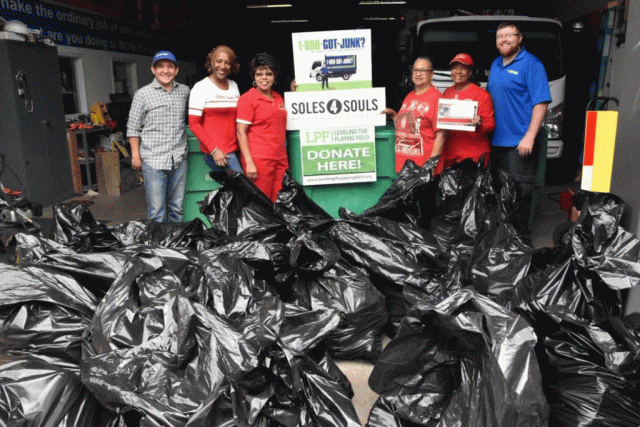
What can’t runners get rid of?
While there are plenty of avenues to donate old running gear, parting with it is a different story.
For Moise Joseph, the store manager at Potomac River Running’s Reston location, it’s his running shoes. The oldest running shoes in his closet, he reluctantly admits, are ones he used three years ago.
“When you put so many miles on a running shoes, you are connected to that shoe,” he said. “It’s hard to let go of something that has carried you through the good and bad miles and you have a connection with.”
Working at a running store has its perks, he admits. After spring cleaning, it’s easy for him to donate his running shoes and buy new ones.
Schultz said he is inclined to hold on to race T-shirts for events that he earned a personal record, but some his T-shirts from fun runs he did after first moving to the D.C.-area from Topeka, Kansas, have the most sentimental value. The nearly 13-year-old shirts represent a change in his life, hobbies and friendships.
“[The fun runs] were an opportunity to find folks who I didn’t work with and could form a connection with through running,” Schultz said. “The shirts are really representative of some of the best friends I have in my life.”
D.C. runner Laetitia Brock says she is newer to running, so “every race shirt, medal or bib feels pretty unique and special.” While her T-shirt, bib or running shoe collection may not be robust, she said she has a hard time parting with the encouraging signs her friends have made for her to cheer her on during races.
After years as a spectator, the signs signify an achievement she savors.
“I love the cheeky and clever signs people always seem to come up with … but it truly means so much to me to see a familiar faces in the crowd as I am running. So I keep their signs when I can,” she said. “I haven’t figured out yet how I’m going to display them or what I might do with them but I’m certainly saving them!”
Recent Stories
Looking for our race calendar? Click here Submit races here or shop local for running gear
James W. Foley Freedom Run
Inspired by the moral courage of freelance journalist James Foley, the mission of the nonprofit Foley Foundation is to secure the freedom of Americans held captive abroad unjustly by terrorist organizations or rogue states, and to promote journalist safety.
The
Kensington 8K Race
Since 1994, the Kensington 8K Race has been a favorite DC area fall race – a fun, fast event with beauty, challenge, and excitement. Run it this year on Saturday, September 21, 2024!
The 8K distance is $39, with a




